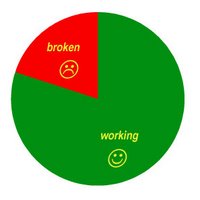"Doing a movie or a play is like running a marathon. Doing a television show is like running until you die." -- David MametI get what Mamet is saying here, but don’t agree with him a hundred percent. Doing a TV series can also be like running a marathon...if you adopt the 80% Solution.
As stated ad nauseam, story department on a TV series is one long monster grind of writing, rewriting, troubleshooting, and crisis management. For example, I came in last week to find the execs scrambling to try to replace an actor who'd suddenly become unavailable. They were having frantic calls with casting directors and agents. Absolute chaos. The other thing I was told that one of the episodes that was presently filming was coming in short. And how did they know? The timings.

A timing is the estimated length of the episode after the script is 'timed' by the script supervisor (who also does continuity). Simply put, he/she acts out each scene in the script with a stop watch - marks that time down beside each scene - and adds them all up to get the estimated length of that script.
In the case of a television half hour, there's one important number and that is the content time. In Canada and US it usually comes in at around 21:40 (a one hour episode content-wise is around 41:30). Content is the actual story. What makes up the rest of the half hour when it goes to air are titles, credits, bumpers, and commercials. So as a writer/producer, the number you are most concerned with is that content time.
In a half hour, ideally the script supervisors timing comes in around 25 minutes. That gives your producers and editors some flexibility to tighten scenes or take some scenes right out if they didn't work or are deemed unnecessary. Timings that come in much longer than that start to cause you grief of having to edit out too much from the show to get it down to time. Coming in under with your timings is a fairly self-evident problem - the episode won't be long enough.
Then, as the episode shoots, you constantly ask for updates on the timings. That means taking what the script supervisor estimated (say 45 seconds for a scene) and the actual time it took to shoot the scene (say the actors read it faster and it comes in at 30 seconds), and comparing these times to see if you are over or under. So when a call comes in that episode has been losing time and is now adding up to 21:00 - it's short.
That’s what I walked into - with just 4 scenes left to shoot in the episode, two later that day.
So it became my job to basically write a minute or so worth of new material into each remaining scene but not make it seem like filler. I couldn’t add new scenes because the shooting schedule was already packed full. It wasn’t that difficult, kinda fun actually. When the parameters are fixed and there’s little room to maneuver, I find it easier to address a problem and solve it. But first I talked to the production designer to find out how much more of a location was dressed and what we’d be able to see. And talked to props to make sure they had a cell phone I’d added to a scene was standing by. And I talked to wardrobe to make sure if actors took off their coats (as I had them doing) in one scene, they were wearing something underneath.
So I rewrote the scenes, and we published new pages (yes, coloured pages) for those scenes and got them quickly to set so the actors could learn the new lines and director could see what he now had to shoot. All before lunch! And they did shoot them. And by the middle of the next day, the episode's timing was up to 23:40 - two minutes over.
Not the best case scenario, but the 80% solution.
 80% is a great target to aim for under those kinds of circumstances - a nice manageable target of accomplishment. If your goal is always a hundred percent perfection, you'll kill yourself, or kill the series, or both. And you'll always be unhappy or unsatisfied if you expect that much of yourself or your crew. Maybe you can expect more on a movie, because it's a one time deal, but a series isn't one show...it's a season of many shows. The series is king, not an episode.
80% is a great target to aim for under those kinds of circumstances - a nice manageable target of accomplishment. If your goal is always a hundred percent perfection, you'll kill yourself, or kill the series, or both. And you'll always be unhappy or unsatisfied if you expect that much of yourself or your crew. Maybe you can expect more on a movie, because it's a one time deal, but a series isn't one show...it's a season of many shows. The series is king, not an episode.Most series in Canada shoot 13 episodes a season (in the U.S. anywhere from 20-24 eps). If a half hour series, you usually have 8 days to shoot 2 episodes...and the total time commitment is around 50-55 days. If a one hour series, 6-7 days per episode is the going rate, and so the time commitment is usually around 80-90 days. And that's just when you're shooting. If you are on staff, you usually start six to eight weeks prior to shooting commencing. That will add another 50 days or so. So depending on what kind of series you're on, you'll be buried for 100-140 days (at least double that if a 22 episode season).
Buried.
And I've worked on shows where execs did treat every episode as if it were the only show. And maybe that first episode turned out good (though usually it was a disappointment because expectations were too high or it was over-worked or over-written or over-produced), but it always came at a price. Other episodes suffered because everyone's attention and energy was being focused on that one episode. There needs to be a point in the development of or writing of or shooting of each episode when it is decided that it's good enough. Or as good as it will be under the circumstances. And move on.
Not that I'm suggesting you should settle for crap. Or to phone it in. But like a marathon, you can and should pace yourself. And rather than a single 100% episode and then three 50% episodes, you and your series will be better off to make them all 80% good.
Oh, and the execs replaced the actor. The replacement did a great job.
Crisis? What crisis?
SONG&ARTIST? - "Jackboots, hi-jacks
Ray guns and spray guns
We got them all for free
Look to the stars for consolation
It could be there lookin' at me
It could be there lookin' at me
Send me down a simple solution
Send me down a simple solution now."
3 comments:
Fantastic post, Will. I like these little "a day in the life" musings from you. Very informative -- and often very amusing.
Great post Will. Hope we bump into each other one day.
dy
Can always count on wisdom from Will. Good post. I think I remember the first time you posted this, but the reminder is timely at the moment, says she's who's run herself into the ground with flu chasing 100%. Thanks. And merry Christmas to you and the brood!
Post a Comment